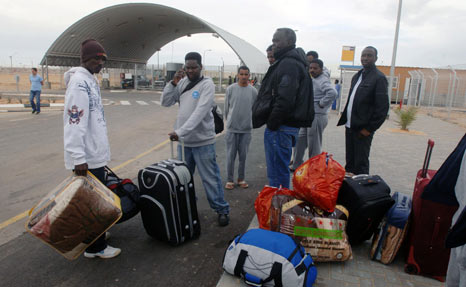Detention of African Asylum Seekers in Israel: Welcome to Round Three
On December 8, 2014, just before the Knesset dissolved itself to prepare for early elections, it enacted the Law for Prevention of Infiltration and Ensuring the Departure of Infiltrators from Israel. IDI's Dr. Reuven (Ruvi) Ziegler reviews this development.

In a previous post, I analysed the Israeli High Court of Justice (HCJ) judgment in HCJ 8425/13 Gebrselassie v. Knesset et al (partial summary of the judgment in English), in which the Court held the 'Law for the Prevention of Infiltration (Amendment No. 4)' (full text in Hebrew) to be unconstitutional and quashed it. The judgment extended a 90 day transition period, which was due to lapse on 22 December 2014.
On 8 December 2014, hours before dissolving itself in preparation for early elections on 17 March 2015, the Knesset (the Israeli Parliament) enacted (by a 47 to 23 majority, with three abstentions) the 'Law for Prevention of Infiltration and Ensuring the Departure of Infiltrators from Israel' (full text in Hebrew). Under the new legislation, 'infiltrators' who enter Israel and cannot be deported will be automatically detained for three months at the Saharonim prison in the Negev desert (reduced from one year under the quashed legislation). 'Infiltrators' already in Israel, as well as new arrivals (following their three months of detention) can be detained at the Holot detention centre for 20 months (as opposed to indefinite detention under the quashed legislation). Over 2,200 persons are currently held in Holot pursuant to the quashed legislation; they are expected to remain for what is now fixed-term detention.
The detainees will be required to report for a headcount between 8 and 10 pm every night, and the detention centre will be locked shut at night. While the length of detention was shortened, its prison-like characteristics (managed by the Israel Prison Service, which conducts searches on persons entering and leaving the facility), the fact that detainees are barred from working, and the facility’s remote location in the Negev desert are likely to render the possibility to leave the facility at daytime rather futile. Moreover, violation of the sign-in conditions can lead to up to four months of detention in the closed facility, at the discretion of the Population, Immigration and Borders Authority.
In the two previous 'rounds', the HCJ unveiled the unsoundness of the overall state policy. On the one hand, Israel recognises the fact that Eritrean and Sudanese nationals cannot be deported. On the other hand, it detains them, in an effort—now explicitly manifested in the legislation’s title—to entice them to leave. It is worth reiterating Justice Uzi Vogelman’s main opinion in the above HCJ judgment, which stressed [193] that 'the question is not only quantitative—what is the maximum constitutional length of time for detention in custody?—but also (and perhaps primarily) qualitative, questioning whether it is permissible to detain a person who is not subject to effective deportation proceedings. To this question I respond…absolutely not.'
Since the legislation applies to 'infiltrators' who according to the state’s determination cannot be deported, persons detained will be released after 20 months without any plan for regularisation of their precarious legal status (see my article on this site). Indeed, the legislation also amends the 'migrant workers law, 1991', imposing financial sanctions on the (majority of) non-detained ‘infiltrators’ who are in un-regularised employment: they will not receive severance pay or pensions to which other Israeli workers are entitled. Instead, their employers will have to deposit 16% of the worker's salary in a separate account on their own behalf, and to deposit a further 20% of the salary on behalf of the employee. This money will be 'released' only upon the departure of the employee. Hefty fines are imposed for breaches. The legislative aim is two-fold: to encourage asylum seekers to leave and to discourage employers from employing them. The immediate outcome will be further destitution, especially as 'infiltrators' do not receive benefits or state assistance.
A petition to the HCJ challenging the constitutionality of the legislation is imminent. Faced with detention legislation premised on the same tenets found to be unconstitutional less than three months ago, the HCJ will be forced into an unsavoury choice: quash legislation for the third time, an unprecedented move in the history of the State of Israel, and face real risk of legislative attempts in the next parliament to limit the Court's power of judicial review, or uphold the legislation based on a proportionality analysis, permitting arbitrary detention of persons in need of international protection. Stay tuned—it promises to be a hot winter.
Dr. Reuven (Ruvi) Ziegler explores questions of immigration, asylum, and citizenship as part of IDI's Democratic Principles project. He is a Lecturer in Law at the University of Reading.
